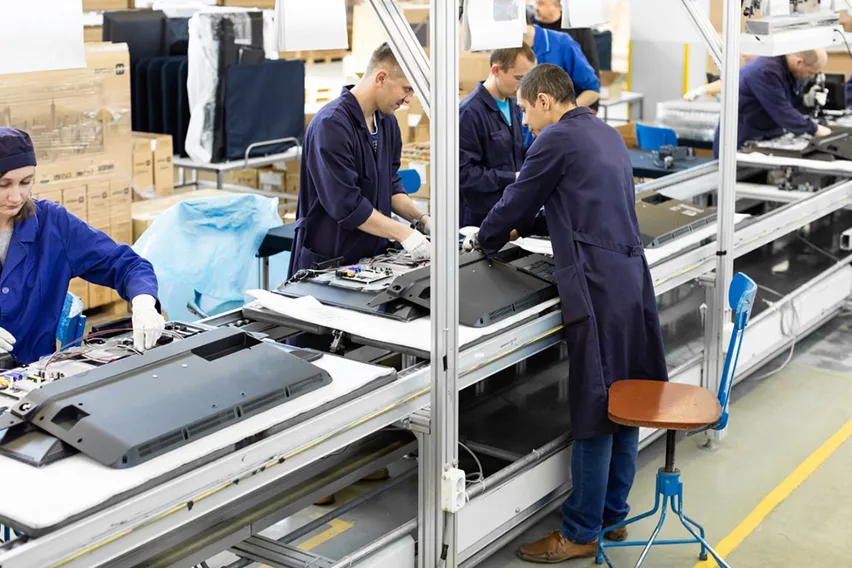What Is an Assembly Line: Definition & Examples

The assembly line is a manufacturing process in which an arrangement of machines works to configure the finished product. Generally, a production line is a semi-automated system in which products go through a production process. Various sections of the line station have human workers who oversee production.
Let’s take a more in-depth look to better understand the assembly line and its function. We reveal exactly what is an assembly line and all that it entails.
Here’s What We’ll Cover:
History and Examples of Assembly Line
History and Examples of Assembly Line
The Terracotta Army’s Assembly Line
For the actual birth of the assembly line, we have to go all the way back to the 3rd century. Yes, back in BC, when Qin Shi Huang’s Terracotta Army used an archaic variation to produce molded figures in workshops. It’s also believed that they made drainage pipes this way.
As far as studies can tell, this is the earliest example. Fast-forward to the 20th century, and Henry Ford would improve on the concept.
The modern assembly line is a fundamental component of production. And it was the Highland Park Ford Plant that made them famous. This was a boon for Ford’s mass production in Highland Park and beyond. It enabled faster production time, which led to greater economic power.

Henry Ford’s Assembly Line
Ford’s line meant cheaper Model T cars. Not only that, but it also meant that the wages of assembly line workers were higher. Indeed, it was Henry Ford who mastered the art of the moving variation. As such, he was able to reduce the labor time of manufacturing vehicles.
As a result, Ford increased the number of cars and parts produced each day. What’s more, Ford was the first company to use the concept to build large factories that made use of this technology.
Mass production proved to be a catalyst to promote modern consumer culture by reducing unit costs. People often say that Ford’s production system is very clever because it made new customers out of Ford’s own workers. Ford’s potential market had become a reality thanks to the line.
The higher demand led to a greater economic scale. This early quality of growth made Ford famous all over the world. As such, it became a model for other industries to aspire to. Other companies rose to the occasion and sought to match the drive that came out of the Ford Motor Company.
Although Ford didn’t invent this technology, he certainly improved on it for mass production. Industries everywhere benefit from Ford’s improvements, both those in the past and in the present. And with ongoing improvements and the implementation of technology, the line will only get better.

Updated Methods
Modern assembly line methods help increase productivity and efficiency in factories. Ongoing advancements in methods continue to thrive. New and more efficient methods of achieving goals continue to improve production throughput.
Throughput refers to production rates in a given period of time. This measure of output increases with each improvement on the line and its methods. These methods mostly have to do with manufacturing processes.
However, business experts are also known to apply these principles to areas outside of production. For example, you can see some line methods in business management. A great example is FreshBooks Projects.
This comprehensive software helps you improve productivity exponentially. Now you can spend less time completing projects of all scopes and scales. What’s more, FreshBooks’ collaboration capabilities ensure faster results.
But not just any results. Thanks to the comprehensive suite of tools offered by FreshBooks, you can look forward to amazing results. In a way, FreshBooks is the ultimate assembly line method. There are more moving parts and technology that are capable of things traditional methods can only dream of doing.
From time tracking to accounting, streamlined productivity is the best it possibly can be. To ensure that you are managing your projects and teams at your highest capacity, be sure to try out FreshBooks.
Key Takeaways
Assembly lines are an example of what can be when teams work together for a cause. You can apply this principle to other facets of the business to achieve great results.
If you want to learn more about team building and team development to get the full potential of your employees check out our post on Tuckman’s Stages of Group Development.
RELATED ARTICLES

 Alternative Fee Arrangements: Types & Examples
Alternative Fee Arrangements: Types & Examples How to Build a Client Base: 5 Ways to Grow
How to Build a Client Base: 5 Ways to Grow What Makes a Great Manager: 7 Must-Have Qualities
What Makes a Great Manager: 7 Must-Have Qualities 7 Workplace Distractions & How to Avoid Them
7 Workplace Distractions & How to Avoid Them What Is a Total Compensation Statement & Its Components
What Is a Total Compensation Statement & Its Components Tuckman’s Theory: Five Stages of Team Development
Tuckman’s Theory: Five Stages of Team Development